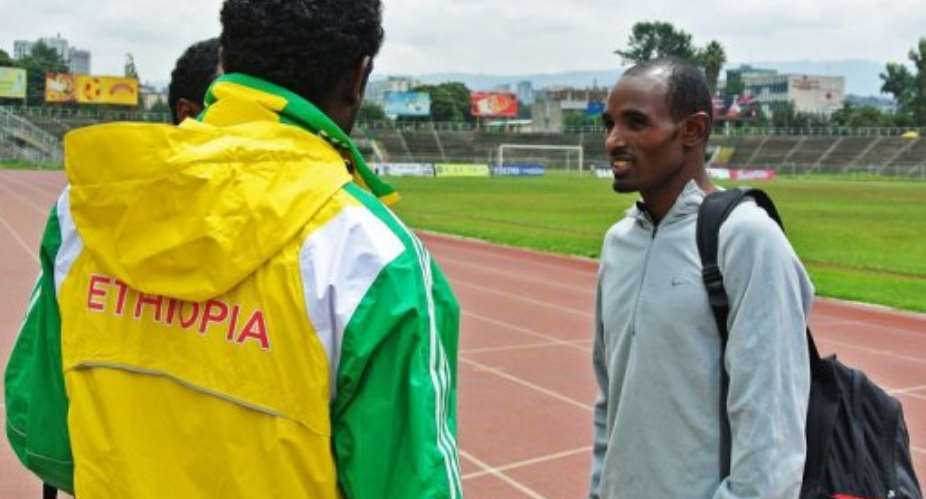ADDIS ABABA (AFP) - Beneath the colourfully painted Olympic rings at Ethiopia's national stadium, running hopefuls circle the track, sweating and breathless, as coaches shout out "good job!" and "beautiful!"
For many of these runners, the London 2012 games will be their first time competing in the Olympics, as running veterans -- including legend Haile Gebrselassie -- pass the baton to Ethiopia's next generation of young, promising stars.
"The new generation is coming, and they are performing better, even (Gebrselassie) is saying he wants to see the new generation perform like him... everybody wants to see that," the head coach of Ethiopia's Olympic team, Yirma Berta, told AFP.
Two-time Olympic 10,000m champion and the godfather of Ethiopian long distance running, Gebrselassie, 39, failed to qualify for this year's Games.
At the forefront of Ethiopia's rising stars are 800m runners, Fantu Magiso Manedo, 20, and 18-year-old Mohammed Aman, a much-anticipated Olympic favourite.
Mohammed set the 800m men's record for Ethiopia last year when he came in first place in Rieti, Italy with a time of 1:43.
He said the fleet of young athletes heading to London are a promising bunch, not only because they train hard but because they have the support of strong coaches behind them.
Young runners are not only dominating middle-distance running but also the marathon team, which has an average age of 25 for men, and 24 for women.
The average age of male marathon runners from Kenya -- Ethiopia's strongest competitors in Africa -- is 29 for men and 30 for women.
"We are developing our team with youngsters so we can have an advantage with our athletes," said marathon coach Melaku Deresse.
Several well-established names qualified for the team this year, with Olympic champion Tirunesh Dibaba defending her 10,000m title.
Tirunesh, who also won first place in 5,000 in Beijing, qualified as a reserve for the 5,000 category this year.
Olympic champion Keninisa Bekele, 29, also the title holder for both the 5,000m 10,000m races, will compete in 5,000m, but only qualified as a reserve for the 10,000m race this year.
Despite suffering a three-year injury, his teammates have high hopes for him.
"He is a very strong athlete, as an Ethiopian and as an athlete I am very happy with his (recovery) and am very confident that he will perform in the Olympics," marathoner Aselefech Mergia said.
With his talent, and the strength of the entire 33-person team, she hopes Ethiopia will bring home at least three gold medals, though her teammate, marathon runner Dino Sefir, said he is hoping for six: "why not?" he queried.
"Every runner in Ethiopia has the desire to win and to make history. That is also my passion, to be a history-maker," he said.
Ethiopia is known for producing marathon champions, including Abebe Bikila, who famously won marathon gold in the 1960 Rome Olympics after completing the race barefoot.
The 2012 London Games is the first time Ethiopia will compete for 800 metre titles for both men and women, signalling a move toward middle-distance running among the country's athletes, traditionally known for producing long-distance champions.
"We have to focus on that, because it is not good to just focus on 5,000m, 10,000m and marathons," Yirma said. "Some of our middle distance runners are coming, they are good and they are trying you outshine the world," he added.
Dube Jillo, technical director for the Ethiopian Athletics Federation, said with more young runners entering professional athletics, it is natural that participation in shorter distances expands. He did not rule out moving into short-distance running racing in the future.
"For the upcoming Brazil Olympics, maybe we will try coming down to 400 metres and 200 metres, why not?" he said. "We are going to continue our job, we never sleep."
Mohammed said he focused on 800m running because he started setting records at a young age, even though he idolised long distance runners as a child.
"That is the history, but you have to change history," he said with a timid smile.
He now carries the hope of his nation to London 2012 where he said he is aiming for gold.
"I have to train hard to bring gold for me and my country," he said, sitting under an awning to escape Ethiopia's cold July rains.
"If you believe, if you run, if you try hard, put a little pressure, that's good, it makes me stronger."





 Saglemi Housing Project will not be left to rot – Kojo Oppong Nkrumah
Saglemi Housing Project will not be left to rot – Kojo Oppong Nkrumah
 Transport fares hike: GPRTU issue two-day ultimatum
Transport fares hike: GPRTU issue two-day ultimatum
 ARC endorses Alan as presidential candidate – Buaben Asamoa
ARC endorses Alan as presidential candidate – Buaben Asamoa
 Akufo-Addo appoints Kwasi Agyei as new Controller and Accountant-General
Akufo-Addo appoints Kwasi Agyei as new Controller and Accountant-General
 PNC dismiss reports of mass resignations
PNC dismiss reports of mass resignations
 PAC advocates for revenue collectors to be engaged on commission basis, not full...
PAC advocates for revenue collectors to be engaged on commission basis, not full...
 Genser Energy commissions 110km of natural gas pipeline at Anwomaso
Genser Energy commissions 110km of natural gas pipeline at Anwomaso
 Naa Torshie calls for tolerance, peace ahead of 2024 election
Naa Torshie calls for tolerance, peace ahead of 2024 election
 Asantehene commends Matthew Opoku Prempeh for conceiving GENSER Kumasi Pipeline ...
Asantehene commends Matthew Opoku Prempeh for conceiving GENSER Kumasi Pipeline ...
 Let’s do away with ‘slash and burn politics’ in Ghana — Dr Adutwum
Let’s do away with ‘slash and burn politics’ in Ghana — Dr Adutwum
